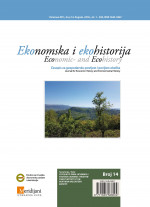EXPLOITING AND CONSERVING: FORESTS, NATION, AND STRATEGIES OF DEVELOPMENT IN 20TH CENTURY ALBANIA
EXPLOITING AND CONSERVING: FORESTS, NATION, AND STRATEGIES OF DEVELOPMENT IN 20TH CENTURY ALBANIA
Author(s): Artan R. HoxhaSubject(s): Geography, Regional studies, Recent History (1900 till today), Human Ecology, Environmental interactions
Published by: Društvo za hrvatsku ekonomsku povijest i ekohistoriju - Izdavačka kuća Meridijani
Keywords: forests; territorialization; development; nationalism; illegal logging; communism; interwar era; post-socialist transition;
Summary/Abstract: Since the 19th-century, forests have been considered both a source for the economic development and a patrimony to be defended. This dualism between the economic gains and ecological imperatives have remained largely unbridged. The Albanian experience is not an exception to this trajectory. Although the different political and intellectual elites have considered forests a national patrimony, they have failed to defend and expand the forest-cover which have been shrinking. The territory of today’s Albania, due to its geographical position, climatic influences, and topography has a very rich flora, including forests. Like everywhere else, human activity has historically played a critical role in the condition and distribution of forest cover in Albania. Until the establishment of the Albanian national state, both the rural population and the elite exploited the forests without paying attention to their regeneration. The Ottoman Empire started to implement policies for the central management of the forests, but in the Albanian provinces, their effects were limited. The Ottoman bureaucracy did not stop the rural communities and landlords to log the forests for fuel, export their timber, burn them for opening new pastures or rooting out the bandits hiding in them. Since its establishment, the Albanian state tried to control the access of the population to forests’ resources. During the interwar era, Tirana’s governments started the process of territorialization, whose goal was to control both forests and rural communities, especially in the highlands that had historically been outside central authorities’ reach. Forests and the control over them became an arena of tensions between state and rural communities. In the end, in the 1920s-1930s territorialization remained a goal rather than become a reality because the state could neither enforce its laws nor exert full control over forests. Except for some small efforts, the forestation did not advance much, and the medium-altitude and low altitude forests were gravely damaged. When the communists came in power, they promised to reverse this situation. However, with its project of industrialization and the policy of economic autarchy, the communist regime overharvested the forests and it was unable to stop the unauthorized logging of rural communities. Regardless of some significant forestations, the communists harvested more timber than the forests could naturally regenerate, impacting negatively the forest cover area. In the first decade after the fall of communism, due also to the political turmoil the country experienced, the forests kept being overused and Albania had the highest percentage of illegal logging in Eastern Europe.
Journal: Ekonomska i ekohistorija - Časopis za gospodarsku povijest i povijest okoliša
- Issue Year: 2018
- Issue No: 14
- Page Range: 145-167
- Page Count: 23
- Language: English

